- Home
- Brandon Mull
Legend of the Dragon Slayer
Legend of the Dragon Slayer Read online
Dear Kendra,
With dark days upon us, and even greater peril looming, I entrust this book to your care. Ever since dragons started hunting mankind, dragon slayers have challenged them. In the ancient dragon war, these champions played a pivotal role resolving the conflict. Every dragon sanctuary has an appointed dragon slayer, and some rare agents of Dragonwatch have achieved that status as well.
The five legendary dragon slayers still walk the Earth, though their whereabouts remain unknown. It is possible that these original dragon slayers have lost all sense of their true identities, which has repeatedly happened over the centuries. As this new dragon war escalates, we need the help of the legendary dragon slayers if we want to stop Celebrant from overrunning the world. The Dragon King and his subjects understand the threat the legendary dragon slayers pose, and will be trying to locate and eliminate them.
Over time, this book has passed through many hands, and now it comes to you. The story recounts how the dragon slayers originated. As a member of Dragonwatch, you should become familiar with this tale, especially since you are searching for the Legender himself and his four offspring. It is also relevant to familiarize yourself with the rise of Selona, the secret magical country from whence the Fair Folk emerged.
This is a treasured copy of the story, complete with a map of Selona and an illustrated enumeration of notable dragon slayers. May the information within these pages serve you well.
Your comrade in peril,
Andromadus
Book endsheets by JojoTextures/Shutterstock.com
Text © 2021 Brandon Mull
Illustrations © 2021 Brandon Dorman
All rights reserved. No part of this book may be reproduced in any form or by any means without permission in writing from the publisher, Shadow Mountain®, at [email protected]. The views expressed herein are the responsibility of the author and do not necessarily represent the position of Shadow Mountain.
All characters in this book are fictitious, and any resemblance to actual persons, living or dead, is purely coincidental.
Visit us at shadowmountain.com
Library of Congress Cataloging-in-Publication Data
(CIP data on file)
ISBN 978-1-62972-849-0 | eISBN 978-1-62973-997-7
Printed in China
RR Donnelley, Dongguan, China 12/2020
10 9 8 7 6 5 4 3 2 1
To Chris Schoebinger, who got all of this started.
—BM
To my dad, who can always be found helping those
in need of rescue from life’s dragons.
—BD
Contents
Legend of the Dragon Slayer
Gorgon
Yeti
Vampire
Phoenix
Dragon
Enumeration of Notable Dragon Slayers
Long ago, before the world had been properly mapped, King Titus feared for the kingdom he ruled. His beloved realm of Selona enjoyed modest prosperity but was hemmed in on all sides by terrible dangers. To the north, fierce yeti guarded their icy peaks. A merciless vampire haunted the eastern waterways. Access to the southern swamp was impeded by the arcane powers of the gorgon. And in the west, a deadly phoenix scorched his rocky domain.
One day in the late spring, the king issued a proclamation: “Selona is growing, but we lack room to expand. My engineers believe we could drain the swamp to the south if only we had safe access. If any man will overthrow the gorgon, I shall grant him the title Earl of Farcastle, along with the associated estate and all pertaining lands, including the mill and the village of Drygap. This offer will stand for the next three days.”
Many in the nation of Selona were astonished at the news, for the earldom of Farcastle was among the most prosperous in the kingdom, and though the recently deceased earl had left no direct heirs, the majority assumed the property would pass to one of many surviving nephews. But in Selona, the word of the king was law, and the people waited to see what brave soldier would come forward to claim the prize.
On the first day, many a seasoned soldier was heard grumbling that if he were ten years younger, he would slay the gorgon simply on principle. And plenty of tenderfoot soldiers were heard boasting that after gaining a bit more experience, they would make short work of the threat to the south and then donate the earldom to orphans. But not a single person accepted the challenge.
On day two, the proclamation was repeated by commanders to their companies, who encouraged the best of their men to rise up and accept the challenge of the king. Wives spoke of the opportunity to husbands, fathers repeated the challenge to sons, and sons fantasized with friends about becoming heroes. When it came to actual volunteers, a drunkard made some vague boasts before staggering away, and a child of seven years tried to sign up until his mother carried him off, but not a single viable applicant came forward.
By day three, the king and his closest advisers began to worry that perhaps the bravest and best of the men of Selona had already attempted to dispose of the threats and failed, leaving behind none bold enough to fill their boots. Near the end of the third day, as the shadows grew long across the town square, an unlikely candidate approached to volunteer.
Konrad, the cobbler’s son, was a tall and gangly youth of seventeen. Given to reading more than to action, he had taken up three different apprenticeships only to get dismissed—twice for trying to invent new processes before mastering the basics, and once for talking too much. He was liked well enough by the children who listened to his stories, but many in the older generation felt sorry for the cobbler, whose only offspring seemed a lazy dreamer.
“I may be untested, and I admittedly lack training as a soldier, but I have a willing hand and strength to bear a sword,” Konrad said. “I have wrestled with my impulse to step forward since the proclamation was issued, but I can resist no longer. I will slay the gorgon, though I have neither weaponry nor supplies.”
After a stunned silence, and some muffled laughs from bystanders, the recruiters realized this might be the only offer they would receive. So, after the sun went down, Konrad was ushered to stand before the king. The candidate was met with graciousness on the surface and despair behind closed doors, for nobody expected the untried youth to succeed where seasoned mercenaries had failed. Nevertheless, Konrad received a horse, leather armor, new boots, a dagger, and a short sword. More imposing armaments were offered, but they seemed cumbersome to Konrad, who also rejected the weight of a helm and a shield.
The following day at first light, Konrad rode away, leaving behind the cheers of the village and the tears of his mother. Not one person expected to see him again, and, besides the cobbler’s household, nobody bothered to mourn him. Weeks went by and the days grew hotter, leaving his departure mostly forgotten until, late one blistering afternoon, Konrad returned, gaunt, bedraggled, clothes soiled and torn. Once his identity had been established, the beggarly figure was escorted into the castle to recount his tale before a small, impromptu audience, including the king.
“I left my horse at the brink of the swamp and proceeded on foot, squelching through mud that gripped to the knee, eventually swimming more than walking. Whoever endeavors to drain that swamp has a mighty labor ahead. I will not tell all the tales I could of leeches and snakes, of quicksand and spiders, of pagan totems and scattered bones. Let it suffice to say that after languishing in fetid water for days, my body an exhibition of rashes, bites, and sores, I discovered an expanse of deep water in the midst of the bog.
“Out toward the middle of this pond, I spied a primitive hut adr
ift on a wooden raft. Human skeletons dangled from crude rafters. I approached with caution, though an unseen splash hinted that my presence was no mystery. My friends will tell you that I am a standout swimmer, but as I stroked toward the hut, strong hands seized me and pulled me deep, to my supposed doom.
“I awoke caged at the rear of a warm room that reeked of unsavory spices. My hair still wet, I’d been stripped to the waist, boots and weapons gone. From the slow rotation of the room, I understood that I was now inside the hut I had identified.
“A foul cauldron frothed in the center of the room, and beside it coiled a grotesque woman. From the waist down she was a huge snake, with a row of sharp quills bristling along the top ridge of her serpent tail. Tightly knit scales sheathed her humanoid torso, and her hideous face was wretched beyond description, with needle teeth and black, soulless eyes. Slime entangled her long, weedy hair.
“Some say the gaze of a gorgon can turn a man to stone. I can only report that, although my body remained fleshy, I lost the ability to move at the sight of her, so great was my loss of courage.
“As I watched the gorgon add bizarre ingredients to her roiling cauldron—crushed herbs and carved stones and pickled organs—her glances at me soon suggested that I would be the final inclusion to her devilish stew. While stirring the hellbroth, she howled out the window, provoking savage replies from the denizens of the swamp. When at last she approached my cage, fiendishly grinning, I withdrew to the rear of the rusty enclosure.
“Why not try to overpower her when she opened the cage door? Allow me to clarify that from her waist to her crown she was taller than I, and I’d sampled her brutal strength in the water. Terror overtook me as her long tail entered the cage, curled about my waist, and withdrew me as if I weighed no more than a bag of straw.
“I have no doubt I would have exited to my death had I not reacted quickly. Driven by instinct more than design, I plucked a quill from the snake tail and plunged it into the back of her human torso, whereupon she let out a shriek to send nightmares scurrying. Immediately the gorgon dropped me and scrambled from the hut, her lashing tail overturning furnishings and sending crockery crashing. From the doorway, I watched her traverse the pond to a muddy patch of shore, where she turned entirely to stone.
“I will not elaborate on my careful verification that she had indeed become a statue, my treacherous journey out of the swamp, or the successful recovery of my horse. Let me assure you that if you send an expedition deep into the swamp, you will find the pond, the hut, and the corpse of the gorgon exactly as described. In my hand is the very quill I used to stab the villain. I invite the king to handle it if he wishes. The swamp is now safe to be drained, though I warn all who venture therein to beware of natural dangers such as snakes and disease.”
In the following days the story was confirmed, and work began to drain the swamp and farm the lands near the brink. Konrad received his earldom amid considerable pageantry, no prouder mother than his could be found in all the land, and the kingdom of Selona rejoiced at their chance to enlarge their southern boundaries.
A few years passed, and the kingdom of Selona prospered. But there were limits to how much swampland could be made habitable, and in time King Titus turned his gaze northward.
A proclamation again went forth: “To the north lie vales to inhabit, slopes where flocks could graze, and mountains to mine. If any man will lead an expedition north and destroy the yetis who patrol the mountain passes, I will name him the Duke of Hinterhill and bequeath to him all lands and titles associated with that fair castle. This offer will stand for the next three days.”
The proclamation generated much talk and little action, until near the end of the third day, when Konrad, the Earl of Farcastle, came forward. Dressed respectably, and having filled out admirably since he was seventeen, the young nobleman was taken more seriously than when he had volunteered to go south.
This time, Konrad needed no assistance to outfit himself, for he had managed his estate well and was able to gather warm clothes and climbing gear, though none in his employ had enough courage to undertake the dangerous mission alongside him. Again, he was alone, and many supposed that he rode to his demise.
Some hunters worried Konrad should have waited for full summer instead of making the trek in the spring. Among townsfolk, reminders were issued that a person could get lucky once, but expecting similar luck again was an affront to fate. But six weeks later, to the astonishment of most, Konrad returned looking leaner, limping slightly, lips chapped, but otherwise unhurt. He was promptly ushered into the throne room, where a large group gathered to hear him.
“I wish I had better heeded some of the elder members of the community, for winter lingers long in the mountain passes. I left my noble mount in a frosty meadow to proceed up an icy slope on foot. There is no need to bore you with complaints of freezing temperatures, blinding blizzards, and rumbling avalanches. I will not dwell upon details of hollowing out snowbanks with frozen fingers to create shelter, nor recount the mournful howls of wolves in the night, nor belabor the perils of scaling crystalline faces of ice.
“After I spent a fierce night huddled in a shallow ice cave, the air became still and the sun peeked out, turning the mountain snowfields into blazing diamonds. That morning, I found a footprint large enough for me to sit inside. As I encountered more oversized tracks, I began to question whether I wanted to locate a creature who made such large, deep impressions in the snow. Before I could fully refine my intent, the creature found me.
“And it was not alone.
“The yetis had shaggy, apelike bodies and heads like arctic wolves with shortened muzzles. They moved over the snow with ease and showed signs of cunning if not great intelligence. I would have preferred to lead an army of men to attack a single yeti—instead, a pack of them had found me. The grizzliest of bears would seem a modest pet beside the smallest of their number.
“With no hope of prevailing in combat, I attempted to flee. One glance at their fluid strides told me I would not outrun them, so with a prayer that recklessness might triumph where ability was lacking, I flung myself down the steepest nearby slope. The world spun and powdery snow sprayed haphazardly until I came to rest near the mouth of a cave. The mountain vibrated with the roars of the yetis as they bounded down the slope after me.
“Lacking superior options, I dashed into the opening and soon discovered the cavity to be no minor snow tunnel, but rather a long and winding cave that burrowed deep into the rock of the mountainside. Although the darkness deepened as the entrance receded, still I opted to plunge ahead blindly in hopes my pursuers would not follow. Though generally the cave was roomy, my heart swelled with gratitude when I passed through any narrow opening that might hamper their pursuit.
“Once the darkness became complete, my progress slowed dramatically, not only because of unseen obstacles on the cavern floor, but because it soon became impossible to anticipate where I would find the next opening through which to advance. Before long, I could not tell which direction I was facing. The subterranean atmosphere, though not warm, was well above freezing, and when my heavy coat became a burden, I shrugged it off.
“The bellows of the yetis echoed through the cave, reflecting horrifically off unseen stone surfaces. Fumbling through my belongings, I found flint and steel, and then a small oil lamp. Frantic sparks led to modest illumination, and I rushed deeper into the cavern.
“By the mellow light of my lamp, the yetis behind me were not yet visible, though their caterwauling seemed to come from all directions. I knew the light made me an easy target, but I needed the glow to advance and realized that the yetis might track me as easily by smell as by sight.
“I believe that at first, the yetis did hesitate to follow me underground. As I progressed, the roars from behind drew rapidly nearer. I began to run recklessly, fearful of turning an ankle, but more frightened of being torn limb from limb.
&
nbsp; “Beyond a narrow passage, I reached a vast chamber decorated with stalactites and stalagmites and littered with stones. Not halfway across the broad floor, I saw several yetis appear behind me, lamplight glinting off ferocious teeth and eyes. Their triumphant bellows assaulted my ears, and I noticed creaking and cracking from above. A hasty glance showed webs of fissures in the uneven ceiling where chandeliers of stone dangled precariously.
“My last hope was to find an aperture in the wall large enough to accommodate me but cramped enough to prevent the yeti pack from following. I remember a surge of regret that I would not cheat death as I had in the swamp but would instead perish alone in a dark cavern within a remote mountain.
“And then the roof collapsed with a thunder that overpowered the yowls of the yetis. I dove for cover in the lee of a large boulder, which almost certainly saved my life, for though most of the collapse occurred behind me, a multitude of stone fragments scattered wildly around the room. Dust saturated the air as a pair of aftershocks followed the main cave-in. I kept my face to the ground, hands over my mouth and nose to filter my breathing, and still I seemed to inhale mostly particles.
“To my dismay, after the pounding ceased and the rocks settled, the roaring of the yetis persisted. I doubted I had much time before they found their way to me through the rubble and the polluted air. I considered extinguishing my lamp, which for the moment revealed only a brown curtain of dust. As seconds passed, and the roaring came no nearer, I noticed it displayed an uncommon uniformity.
“Hesitantly, I began to relax, and then to hope. After the worst of the dust cleared, I emerged from my shelter beside the boulder. Clambering over the detritus on the cave floor, I found my way to a view of a stunning, underground waterfall—the source of the endless roar.

 The Candy Shop War
The Candy Shop War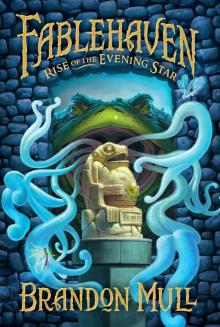 Rise of the Evening Star
Rise of the Evening Star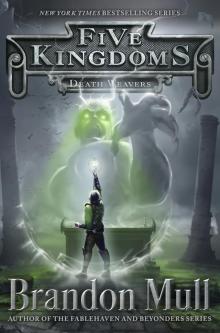 Death Weavers
Death Weavers The Candy Shop War, Vol. 2: Arcade Catastrophe
The Candy Shop War, Vol. 2: Arcade Catastrophe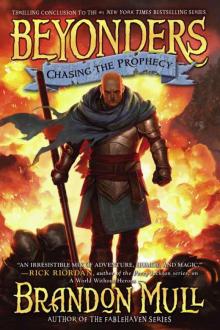 Chasing the Prophecy
Chasing the Prophecy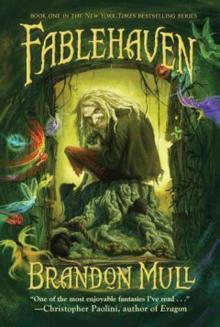 Fablehaven
Fablehaven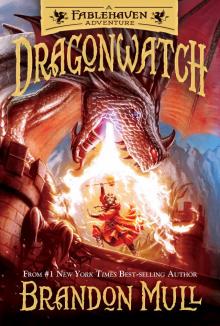 Dragonwatch
Dragonwatch Time Jumpers
Time Jumpers Seeds of Rebellion
Seeds of Rebellion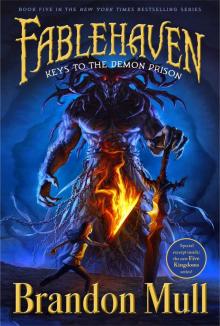 Keys to the Demon Prison
Keys to the Demon Prison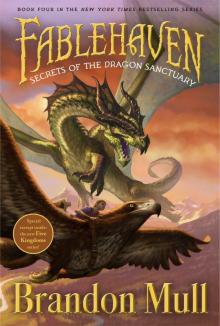 Secrets of the Dragon Sanctuary
Secrets of the Dragon Sanctuary A World Without Heroes
A World Without Heroes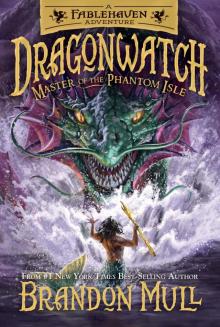 Master of the Phantom Isle
Master of the Phantom Isle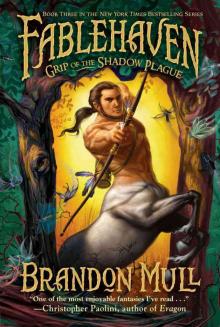 Grip of the Shadow Plague
Grip of the Shadow Plague Crystal Keepers
Crystal Keepers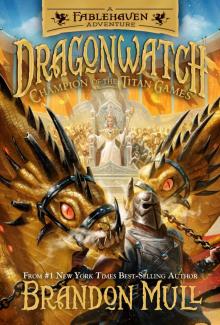 Champion of the Titan Games
Champion of the Titan Games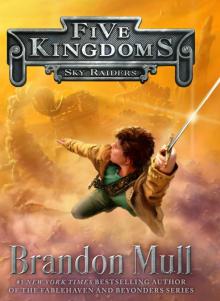 Sky Raiders
Sky Raiders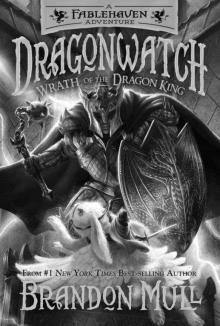 Dragonwatch, Book 2: Wrath of the Dragon King
Dragonwatch, Book 2: Wrath of the Dragon King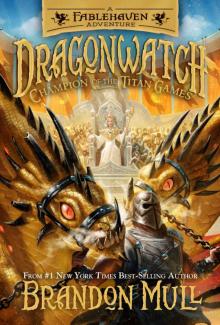 Dragonwatch, vol. 4: Champion of the Titan Games
Dragonwatch, vol. 4: Champion of the Titan Games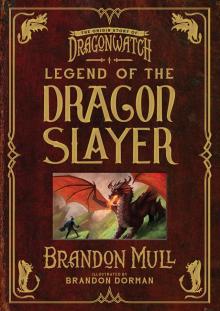 Legend of the Dragon Slayer
Legend of the Dragon Slayer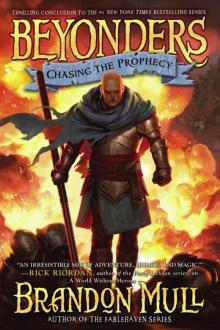 Chasing the Prophecy (Beyonders)
Chasing the Prophecy (Beyonders)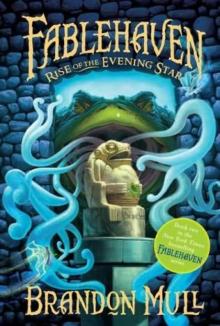 Fablehaven2-Rise of the Evening Star
Fablehaven2-Rise of the Evening Star Candy Shop War
Candy Shop War Wild Born
Wild Born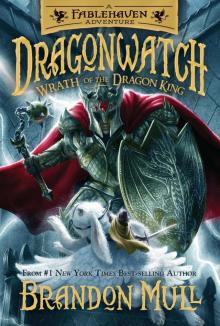 Wrath of the Dragon King
Wrath of the Dragon King Spirit Animals Book 1: Wild Born
Spirit Animals Book 1: Wild Born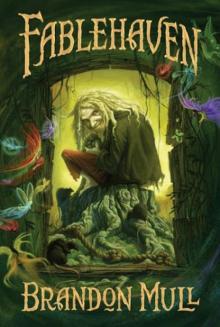 Fablehaven1-Fablehaven
Fablehaven1-Fablehaven Tales of the Fallen Beasts
Tales of the Fallen Beasts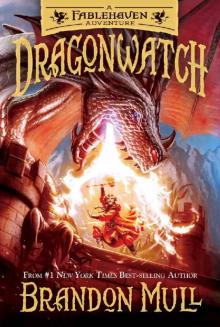 Dragonwatch: A Fablehaven Adventure
Dragonwatch: A Fablehaven Adventure Tales of the Great Beasts
Tales of the Great Beasts